It’s been a difficult week, and I am not comfortable sharing the worst of it in a public space like this, but although I was enormously inconvenienced and somewhat stressed, nobody got hurt and nothing important was lost, so I consider myself pretty blessed. Even in my worst weeks, my life is pretty great.
Saturday when I was out for a long walk, something flew into my eye and stayed there. It was miserable. I took myself home and after several attempts to wash it out, just went to bed hoping my eye would discharge the foreign matter while I slept. It didn’t.
So Sunday morning I took myself to the ER, something I never do. The last time was more than fifteen years ago when I snapped a ligament in my calf at work and really had no choice. The doctor said he couldn’t see anything in my eye but I did have an abrasion. He speculated that something flew into my eye, abraded it, and bounced out, and said it should be fine in a day or two, which turned out to be true.
Until then, I was constantly aware of this discomfort in my eye, and found myself tearing up uncontrollably at times. It was miserable.
Came home from work early Tuesday because I was feeling physically crappy in the midst of dealing with the other ickiness (the stuff I’m not detailing). Then my planned vacation day Wednesday (to deal with practical fixes for this ickiness) turned into a stay-in-bed-all-day day because I was still ill. Finally felt mostly better Wednesday night and never got to finish the business I meant to take care of, so I took a half day of vacation Thursday and still didn’t get it done.
It’s been like that.
I did have a fairly productive half-day at work Thursday, though, so the trend is upward. I’m hoping to settle matters Friday evening so I can enjoy the weekend, which will include a Halloween party at a HS classmate’s house and hanging out with the folks.
Also have to start preparing for my trip, which is exciting. I’ve decided not to share details about it until I get back, but I promise I will.
From here.
- When are you the straw that stirs the drink?
I am not nearly the drink-stirrer I once was, especially since I work in a new place and am a low person on the totem pole. However, I have used my voice to speak up on behalf of our nursing moms. I’ve been with the foundation for nearly two years, and the space we use for a nursing room could be a lot more hospitable. I really think we aren’t making this high-enough a priority. - Who has delivered the most stirring rendition of your country’s national anthem?
There’s a video going around this week of Willie K singing a completely rearranged “The Star-Spangled Banner” at the UH Manoa vs. Nevada football game last weekend, and it’s quite terrific, but my favorite all time is still Huey Lewis and the News, who’ve been singing it at baseball games since the mid-Eighties. I first saw it to open the All-Star game in San Francisco and couldn’t believe what I was hearing. It sounded the way I think it should sound at a ballgame. The one I’m embedding here is from a few years later, 1987, and while it’s not the best of their performances of this song, this video’s got the best audio. - Who or what is stirring in your vicinity?
The occasional car passing on the street outside. Nothing else I’m aware of. My neighbors on both sides and across the street all retire early. So it’s just me, just the way I like it! - What do you like and dislike in a stir-fry?
Bean sprouts, broccoli, and tofu are my favorite ingredients, but I also like snow peas and baby bok choi if I can get them. Celery and carrots are big turn-offs in a stir-fry. I also prefer a light hoisin sauce over a thick teriyaki sauce, but probably the best is just some olive oil and butter, or maybe some chile oil. - How do you deal with feeling stir-crazy?
I used to go for long walks, but now I get in Jessica and go for a drive, sometimes just around the neighborhood or all the way to the office and back. A few times, I’ve driven somewhere, parked the car, and gone for long walks in more interesting places. I have always loved driving, but now in my second month of car ownership after four years of car non-ownership, I love it even more. Plus the car is air-conditioned and the crib is not, a huge plus in what has been a very humid season.

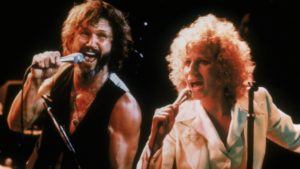 This second remake of A Star is Born is the logical bookend for the collection. In 1937, Janet Gaynor played a rising movie star. In 1954, Judy Garland played a rising star of movie musicals. Now in 1976 Barbra Streisand plays a rising star of pop music, this time as Esther Hoffman instead of Esther Blodgett, with Kris Kristofferson as her alcoholic discoverer, John Norman Howard instead of Norman Maine.
This second remake of A Star is Born is the logical bookend for the collection. In 1937, Janet Gaynor played a rising movie star. In 1954, Judy Garland played a rising star of movie musicals. Now in 1976 Barbra Streisand plays a rising star of pop music, this time as Esther Hoffman instead of Esther Blodgett, with Kris Kristofferson as her alcoholic discoverer, John Norman Howard instead of Norman Maine.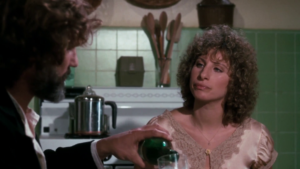 Kristofferson provides the movie something the earlier versions didn’t: a male lead with charisma to tug back against the star. John’s rock-star magnetism and rough road-weariness almost make alcoholism sexy, where in 1937 and 1954 all it did was make men weak. I want to say I disapprove of such representation, but it feels appropriate, and it makes for a much better dynamic.
Kristofferson provides the movie something the earlier versions didn’t: a male lead with charisma to tug back against the star. John’s rock-star magnetism and rough road-weariness almost make alcoholism sexy, where in 1937 and 1954 all it did was make men weak. I want to say I disapprove of such representation, but it feels appropriate, and it makes for a much better dynamic. Esther calls the shots in this relationship from the beginning, and while John nudges her onto the stage for her turn in the spotlight, her success, like the successes of the Esther Blodgetts before her, is entirely hers. A star is born; she isn’t made.
Esther calls the shots in this relationship from the beginning, and while John nudges her onto the stage for her turn in the spotlight, her success, like the successes of the Esther Blodgetts before her, is entirely hers. A star is born; she isn’t made.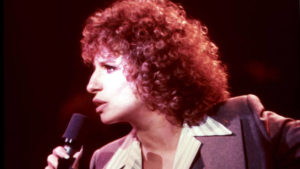 This remake suffers from some of the same period-related stuff as the first remake. It worships Streisand the actress-singer a bit too adoringly and segues twice into that Seventies staple, the golden sunlight country road long drive music video, complete with lens flares. You see the first one coming a mile away, and the second one is only a surprise because who expects that twice?
This remake suffers from some of the same period-related stuff as the first remake. It worships Streisand the actress-singer a bit too adoringly and segues twice into that Seventies staple, the golden sunlight country road long drive music video, complete with lens flares. You see the first one coming a mile away, and the second one is only a surprise because who expects that twice?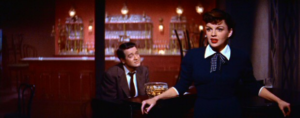 Esther Blodgett is a singer in a band when she meets Norman Maine, a Hollywood star at the very beginning of his career’s decline. Although this 1954 version is my least favorite of the four A Star is Born films, Esther and Norman’s meeting in this one is the best. Norman’s drunk when he wanders onto a stage where Esther and her band are performing. Rather than let Norman be embarrassed, Esther quickly incorporates him into the act, as if he were part of the show.
Esther Blodgett is a singer in a band when she meets Norman Maine, a Hollywood star at the very beginning of his career’s decline. Although this 1954 version is my least favorite of the four A Star is Born films, Esther and Norman’s meeting in this one is the best. Norman’s drunk when he wanders onto a stage where Esther and her band are performing. Rather than let Norman be embarrassed, Esther quickly incorporates him into the act, as if he were part of the show.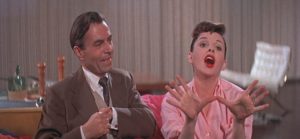 It’s an immediate display of grace, sensitivity, talent, smarts, and self-assuredness that characterizes Esther throughout the film. If only such economy in development could be employed the rest of the way.
It’s an immediate display of grace, sensitivity, talent, smarts, and self-assuredness that characterizes Esther throughout the film. If only such economy in development could be employed the rest of the way.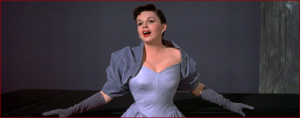 Take out most of the songs, and the film would be a pleasant length, but the filmmakers are determined to make it a comeback tour de force for Garland, who’d been out of movies for four years following the end of her time with MGM.
Take out most of the songs, and the film would be a pleasant length, but the filmmakers are determined to make it a comeback tour de force for Garland, who’d been out of movies for four years following the end of her time with MGM.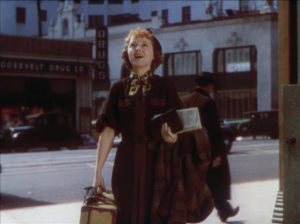 Esther Blodgett is a North Dakota farm girl with dreams of Hollywood stardom. The original A Star is Born movie pretty much begins with her family thinking she’s crazy for even entertaining the notion. Her grandma, however, believes that if you’re willing to risk everything in pursuit of your goals, you have to do it.
Esther Blodgett is a North Dakota farm girl with dreams of Hollywood stardom. The original A Star is Born movie pretty much begins with her family thinking she’s crazy for even entertaining the notion. Her grandma, however, believes that if you’re willing to risk everything in pursuit of your goals, you have to do it.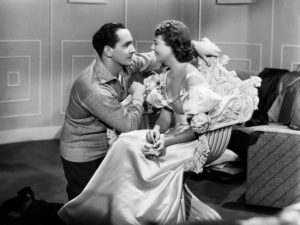 The Esther-Norman relationship drives the film, because while Esther may have needed Norman’s little boost to get through the door, she’s not at all dependent or needy in her relationship with Norman or in any other relationship. Norman clearly needs her far more than she needs him. She just really, really loves him, and he doesn’t quite know how to be loved.
The Esther-Norman relationship drives the film, because while Esther may have needed Norman’s little boost to get through the door, she’s not at all dependent or needy in her relationship with Norman or in any other relationship. Norman clearly needs her far more than she needs him. She just really, really loves him, and he doesn’t quite know how to be loved.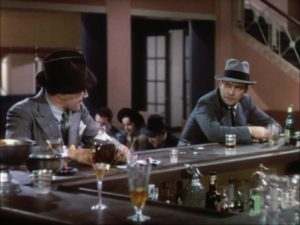 In nearly every way, A Star is Born looks and feels like the popular movies of its time, but with a smart, strong woman taking the lead. Norman is no tragic hero—he’s not a hero at all—but he’s a man loved by a woman. Could his demise have been reversed by a woman like this, or by anyone? The film seems to think not, and as Norman travels along his beautiful, downward spiral, Esther goes along with him because someone has to try.
In nearly every way, A Star is Born looks and feels like the popular movies of its time, but with a smart, strong woman taking the lead. Norman is no tragic hero—he’s not a hero at all—but he’s a man loved by a woman. Could his demise have been reversed by a woman like this, or by anyone? The film seems to think not, and as Norman travels along his beautiful, downward spiral, Esther goes along with him because someone has to try. Kayla is in the last week of eighth grade, where she’s pretty close to invisible and doesn’t seem to have any close friends. Her classmates vote her “Most Quiet,” which bugs Kayla. She doesn’t think of herself as quiet; she doesn’t want to be quiet. She has things to say, but she can’t seem to interest anyone in hearing her.
Kayla is in the last week of eighth grade, where she’s pretty close to invisible and doesn’t seem to have any close friends. Her classmates vote her “Most Quiet,” which bugs Kayla. She doesn’t think of herself as quiet; she doesn’t want to be quiet. She has things to say, but she can’t seem to interest anyone in hearing her.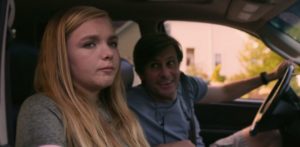 Because most of us were eighth-graders millions of years ago, we’re like Kayla’s dad. We see what a bright, interesting, resilient young woman Kayla is. Unlike Kayla, we also see that the young people around her, the popular kids throwing pool parties at their huge homes and the nerdy cousins and the handsome (barely pubescent) jocks all have their own growing pains.
Because most of us were eighth-graders millions of years ago, we’re like Kayla’s dad. We see what a bright, interesting, resilient young woman Kayla is. Unlike Kayla, we also see that the young people around her, the popular kids throwing pool parties at their huge homes and the nerdy cousins and the handsome (barely pubescent) jocks all have their own growing pains. Kayla takes a foray or two into the world of grownups (read: high-schoolers) where she sort-of experiences the kind of acceptance she longs for. I don’t know what such excursions were like for anyone else, but I imagine Kayla doesn’t see anything especially unusual.
Kayla takes a foray or two into the world of grownups (read: high-schoolers) where she sort-of experiences the kind of acceptance she longs for. I don’t know what such excursions were like for anyone else, but I imagine Kayla doesn’t see anything especially unusual.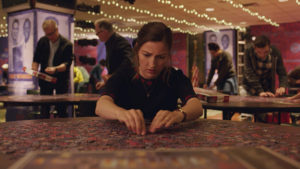 People who know me don’t have to be told I’m predisposed toward liking a movie about a middle-aged homemaker questioning her choices and discovering a love for solving jigsaw puzzles. It’s like this movie was made for me, so take my recommendation with this in mind.
People who know me don’t have to be told I’m predisposed toward liking a movie about a middle-aged homemaker questioning her choices and discovering a love for solving jigsaw puzzles. It’s like this movie was made for me, so take my recommendation with this in mind.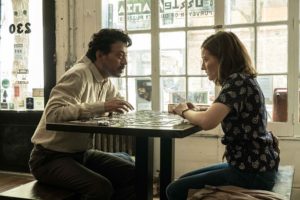 A day after a birthday party thrown for Agnes which she seems to have done all the prepping for and cleaning up after, Agnes takes a few moments for herself, apparently a rare occurrence. One friend has given her a jigsaw puzzle as a birthday gift. She spends the day completing it, and then breaking it apart so she can complete it again.
A day after a birthday party thrown for Agnes which she seems to have done all the prepping for and cleaning up after, Agnes takes a few moments for herself, apparently a rare occurrence. One friend has given her a jigsaw puzzle as a birthday gift. She spends the day completing it, and then breaking it apart so she can complete it again.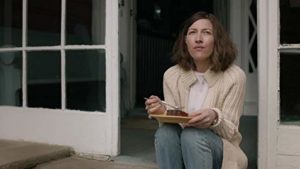 Soon, she is secretly practicing a few times a week with a new puzzle-solving partner—an independently wealthy inventor, recently single, who watches the news all day because he’s fascinated by the destruction.
Soon, she is secretly practicing a few times a week with a new puzzle-solving partner—an independently wealthy inventor, recently single, who watches the news all day because he’s fascinated by the destruction. The Spy Who Dumped Me is not the first female buddy-cop flick, but in the summer of 2018, its existence and moderate success feel like a statement. I was happy to see it just to express my support for such a film, and in fact am disappointed in the title, which refers to a male character who’s pretty much not even in the movie. This is a movie about two friends, not a man who dumps a woman.
The Spy Who Dumped Me is not the first female buddy-cop flick, but in the summer of 2018, its existence and moderate success feel like a statement. I was happy to see it just to express my support for such a film, and in fact am disappointed in the title, which refers to a male character who’s pretty much not even in the movie. This is a movie about two friends, not a man who dumps a woman.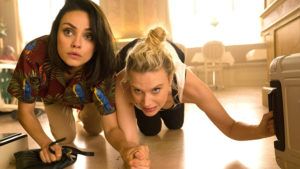 I didn’t care for the violence, which seems to push past gratuitous and into sadistic, and I mean sadistic toward its audience. People come to horrific ends, almost always men and almost always after establishing some kind of rapport with the main characters. Is this also part of the big statement? If it is, there’s probably more going on here than I thought.
I didn’t care for the violence, which seems to push past gratuitous and into sadistic, and I mean sadistic toward its audience. People come to horrific ends, almost always men and almost always after establishing some kind of rapport with the main characters. Is this also part of the big statement? If it is, there’s probably more going on here than I thought. These two younger women are vapid and giggly. Are Audrey and Morgan looking at their former selves, kind of disgusted with what they see but experienced enough to manipulate it? Or are they looking at the idea of young women in movies, nearly completely useless in a genre almost always dominated by men?
These two younger women are vapid and giggly. Are Audrey and Morgan looking at their former selves, kind of disgusted with what they see but experienced enough to manipulate it? Or are they looking at the idea of young women in movies, nearly completely useless in a genre almost always dominated by men?